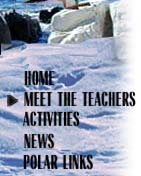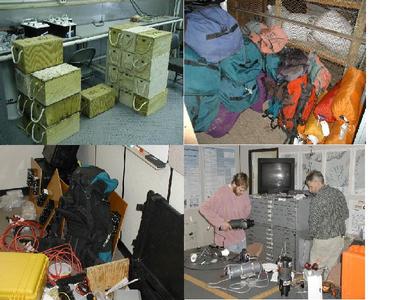
|
|
24 November, 2001
Sorry for the mix-up. There was an entry here that was different than
the one I'm writing now. I'll try to re-invent the events of 11/24.
We outfitted ourselves with sleeping gear in "The Cage." Each member
has a tent, sleeping bag, pack, pads to sleep on, emergency kit, harness
(for climbing) and pillows, liners, etc. It is quite bulky. Again, thank
goodness for helicopters.
We worked today on batteries, power control boxes, and other electrical
details, and this was the substance of my original entry for 11/24. This is
addressed to students:
If you want to be a geologist, take electrical engineering. If you want to
be a chemist or biologist, take physics and math. The act of collecting
data is very electrical. It is not my forte, but necessity is the mother of
invention. Bill McIntosh reinvents the electronics used at the field sites
frequently.
When I suggested to him that I was encouraging students to take
electrical engineering, he agreed but added that simply tinkering--fixing
cars, making things that work--really is the way to learn to make the things
that you need to collect data. The tools that these scientists use rarely
seem to come right out of a box. They are built.
Another compononent is the human interaction. My research students will
appreciate this: Jesse Crain is a graduate student studying radioactive
isotopes that are emitted in the gas plume from Erebus. She already has
data from previous field experiences, but stated at the table last night, "I
just can't seem to wrap myself around the data mathematically. I know it's
just algebra, but I'm not seeing the message here." And Emily Desmerais
(GPS specialist) said, "I'm minoring in math--maybe I could help." Dr. Jeff
Johnson actually asked for my help in using PowerPoint for a talk he has to
give on Sunday night. He's never used it before. I would dare say that
many seventh and eighth grade students could have helped him just as
effectively as I did. One to one is a very cool way to learn. And don't
forget--as daunting as all those wires, capacitors, transistors, and boards
look to me, I know that both you and I could learn this stuff if we had to.
One step at a time. The bottom line: Don't sell yourself short by skimping
on math or science. They have applications all over the place. And when
you have questions, go ahead and read, but especially seek out someone who
knows and talk to them.
_________________________________________________________________
Get your FREE download of MSN Explorer at http://explorer.msn.com/intl.asp

Clockwise from top left: 1) The batteries. Each box holds three of the types of batteries seen on the shelf. This represents about one third of the batteries in the field. 2) Our sleeping gear. 3) Rich Esser and Bill McIntosh attempt to configure the electronics for a remote camera. 4) A small bit of the electronic components being used. _________________________________________________________________ Get your FREE download of MSN Explorer at http://explorer.msn.com/intl.asp
Contact the TEA in the field at
.
If you cannot connect through your browser, copy the
TEA's e-mail address in the "To:" line of
your favorite e-mail package.
|
